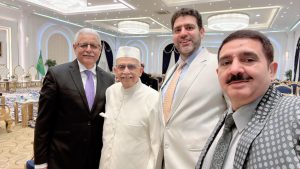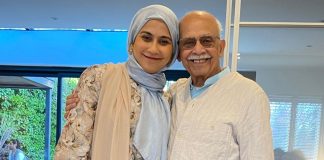As Independence Day arrives on August 14th for Pakistan and August 15th for India, millions across the South Asian diaspora mark the occasion with celebration, remembrance, and quiet reflection. In the UK, where large Indian, Pakistani, and Bangladeshi communities’ live side by side, these dates are more than national holidays. They stir old memories and new hopes and often, difficult questions.
For many in Bradford, Leeds, Dewsbury, and across West Yorkshire, Partition is not just history. It’s a living story passed down through family conversations, silent pauses, and sometimes, deeply traumatic recollections. But despite the painful origins of India and Pakistan’s independence in 1947, British South Asians today are carving out new stories, ones shaped not by division, but by coexistence.

Mr. Ayaz Bahadur Khan, an 84-year-old retired businessman living in London, was a child in Calcutta during Partition. His memories, though decades old, are hauntingly vivid. “There were bodies in the streets,” he recalls. “Even as a boy, I could feel something had shifted. That fear stayed with us.”
His family didn’t leave immediately. Instead, his father carefully planned their migration to East Pakistan, now Bangladesh. “My father was strategic,” Mr. Ayaz explains. “He made trips to Chittagong before we moved, and Hindu friends helped him sell the business in Calcutta. There was humanity in the horror, too.”
In 1949, Mr. Ayaz and his family relocated by train and steamer to Chittagong. For a while, there was peace. But history would fracture again in 1971, during the Bangladesh Liberation War. “I remember neighbours going missing,” he says quietly. “We were Urdu-speaking migrants seen as outsiders by some locals. When war broke out, we had to flee again.”
His family escaped on a cargo ship. Mr. Ayaz stayed behind to sell everything. They eventually reunited in the UK, building a new life again, far from home.
Yet, what stands out in Mr. Ayaz’s story is not only the displacement but the deep longing for harmony. “In London, I found peace at least on the outside,” he says. “Here, I had Hindu and Christian friends. We visited each other’s homes, attended weddings. That kind of friendship, I didn’t always see back home.”
Still, he doesn’t romanticise the present. “There’s peace here, but not always closeness. We coexist, but the wounds of Partition don’t disappear. And in India and Pakistan today? I don’t see peace yet. Politics is poisoning people again.”
Across generations, the emotions surrounding Partition and independence shift sometimes sharply. In interviews conducted with British South Asians across Yorkshire, younger voices reflected a mix of inherited grief, distant connection, and a desire to move forward.
Sana Akbar, 24, a British-Pakistani from Bradford, described it as “bittersweet.” “I feel proud that Pakistan got independence,” she says, “but it’s hard to fully celebrate when you know how traumatic Partition was for so many people.”
Nyla Hussain, 19, a British-Bangladeshi from Huddersfield, shared how Partition still shaped her family’s identity. “We’re from what was East Pakistan, so that whole story is part of who we are. It’s complicated.”
Yusuf, 21, from Halifax, reflected on generational change: “My dad still watches the news like it is India vs. Pakistan. I see people, not politics. We have moved on or at least we want to.”

This generational unease is not limited to one group. For many young British South Asians from Sikh and Hindu backgrounds, Independence Day is layered with both pride and pain.
Ananya Sidhu, 21, a Sikh English Literature student from Leeds, shared: “As a Sikh, Independence Day is complicated. I know our community played a huge role in the fight for freedom, but also suffered a lot during Partition. So, it’s not just a celebration for me, it’s a time to remember that sacrifice and reflect on how divided things became. We still carry some of that pain.”
Ashika Ashok, 22, a Hindu Media and Communications student in Leeds, expressed a similar tension: “I feel proud that India became independent, and I think about what my ancestors might have lived through. But at the same time, I am aware of how much division came with it. As a British Hindu, I feel like it is also a reminder of how we have a role to play in making sure that history doesn’t repeat and that we focus on unity, not just patriotism.”
Many also spoke of friendships across heritage lines. Jassenia Tasleem, 21, from Leeds, said with a smile, “One of my closest friends is Pakistani. We joke that our grandparents would be shocked, but honestly, we’ve bonded over shared trauma and food.”
Rehan (not his real name), 31, from Bradford, added, “We share more common ground in the UK. It’s less political, more about community. We have got similar struggles, housing, jobs, racism that bring us together.”

Even Mr. Ayaz, who has seen more than most, nods gently at the idea of peace abroad but remains cautious about its return back home. “We live peacefully here, yes. But in India and Pakistan? I don’t see peace in the near future. The wounds are too deep, and politics has poisoned minds.”
When asked what independence means now, Mr. Ayaz pauses. “I used to want to visit India again,” he admits. “I even got a visa. But now? I don’t feel safe. If they hear me speak Urdu, I don’t know what might happen. That makes me sad.”
And yet, he hasn’t lost hope. “Because you’re asking these questions,” he tells me. “Because young people still care. That means something.”
Perhaps Mr. Ayaz Bahadur Khan’s final reflection says it best: “If we had stayed in one country, maybe things would’ve been better or maybe not. But here, in this small corner of Britain, I’ve seen the future we once dreamed of. And that gives me hope.”
In cities across the UK, this quiet revolution of unity continues. While the lands of their ancestors may still carry wounds, British South Asians are showing what healing can look like. Not erasing the past but carrying it gently and choosing community over division.
Perhaps this is what independence means now: not just the end of colonial rule, but the beginning of understanding. Not just celebration, but remembrance. Not just flags and borders, but the shared stories that transcend them.




